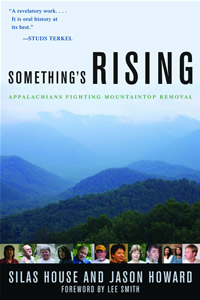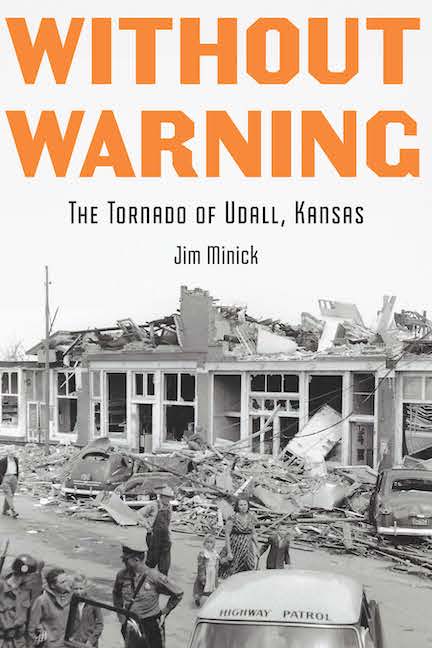Molehills Out of Mountains
In a new oral-history project, novelist Silas House assembles a powerful collection of voices speaking out against the coal-mining practice of mountaintop removal
There are places in the Appalachians where entire mountaintops are blown to smithereens; bulldozers push trees, topsoil, dirt, and rocks off the mountainsides; and the debris fills rivers and streams in the valleys below. This practice, known as mountaintop removal mining and valley fill, turns lush green mountains into barren gray moonscapes. Something’s Rising: Appalachians Fighting Mountaintop Removal, a new collection of oral histories by Silas House and Jason Howard, gives a tally of just what we’re losing to this destructive mining method and notes that the relatively small seams of coal unearthed by the process come at an immeasurably high price.
For House, who teaches at Lincoln Memorial University in Harrogate, and Howard, an editor in Louisville, and for the twelve Appalachians whose stories make up this book, mountaintop removal is not simply an environmental issue: “[I]t also has political, social, ethical, economic—and most of all—cultural ramifications.” House and Howard are descendants of miners and mountaineers, and they still live in the region. They understand the love/hate relationship between the mining companies and the mountain people. The coal industry has long been the primary employer in the area, but the region has an equally long history of skirmishes between the miners’ unions and the mine owners, from strikes and massacres in the 1930s to political maneuverings in the waning days of the Bush administration.
 Because of the coal industry’s tendency to massage the facts and pay off politicians to protect their interests, coal is often referred to as King Coal. But the power of King Coal may finally be weakening thanks to a rising tide of opposition to this newest method of mining. The devastation of mountaintop removal is so visible that even people who don’t traditionally oppose mining are standing up against it. As activist and third-generation coal miner Carl Shoupe points out, “If you can’t deep mine it, it ain’t worth getting out of the mountain in the first place!”
Because of the coal industry’s tendency to massage the facts and pay off politicians to protect their interests, coal is often referred to as King Coal. But the power of King Coal may finally be weakening thanks to a rising tide of opposition to this newest method of mining. The devastation of mountaintop removal is so visible that even people who don’t traditionally oppose mining are standing up against it. As activist and third-generation coal miner Carl Shoupe points out, “If you can’t deep mine it, it ain’t worth getting out of the mountain in the first place!”
Borrowing a page from Studs Terkel, House and Howard allow activists and ordinary citizens to describe in their own words the effects of coal mining—and mountaintop removal in particular—in their communities and on their lives. For many of them, such honesty is difficult. Singer Jean Ritchie, known as the “mother of folk,” is in her eighties and has a history of environmental activism. In the early 1970s, her song “Black Waters” became a rallying cry for environmental activists opposed to strip-mining, and she encourages people to speak out, though she understands their reluctance. “It’s easier for them to not say anything. I think people just think it’s a monumental thing, that they won’t make any difference. They think they’re small and this is large and they’re not going to get anywhere, that they’ll just be beating their head against a stone wall.”
Speaking out can also be risky. Though most miners oppose the practice, they remain silent from the fear of driving away jobs and the risk of being shunned by friends and family. Those who have spoken out in this book, according to House and Howard, “press on because they believe courage is contagious.”
Writer Anne Shelby recounts the first time she got an close-up look at the effects of mountaintop removal. Wendell Berry had invited a number of Kentucky writers to take a tour of such site. On the first stop, the group scrambled up an overhang which offered a view of both the mountains and an area where the mountaintop had been removed. The writers were unprepared for the devastation. Ringed by green forests was a huge blank landscape, devoid of life. Shelby says, “I have all the reasons that are very practical for opposing mountaintop removal, like sedimentation and flooding and blasting ruining people’s homes and leaving nothing for the future, but none of that has anything to do with the way it feels to stand on a piece of land that has been made desolate in that way. … That’s what made me want to get involved in it, that overriding feeling of ‘This cannot be right, not for any reason.'”
Howard describes how writing Something’s Rising has changed even the authors themselves: “We’ve walked on years-old mountaintop removal sites, left behind after companies filed bankruptcy and were therefore not held accountable to properly reclaim the land before they moved on and filed permits under another company name. We have encountered evidence that caused us to question our own government and to shake our heads in wonder at how greed can distort and alter the landscape of a people and the integrity of an entire nation.”
On the first stop, the group scrambled up an overhang which offered a view of both the mountains and an area where the mountaintop had been removed. The writers were unprepared for the devastation. Ringed by green forests was a huge blank landscape, devoid of life.
But deep pockets work against such voices. The coal industry can buy publicity on billboards and commercials, as well as fund coal-friendly projects in schools and the workforce—publicity which reinforces a myth that coal is the only viable economic option for the region. Mining companies claim they provide necessary employment for poor folks, but House and Howard note that mountaintop removal has actually caused job loss because mountaintop removal is more mechanized than deep mining.
According to House and Howard, the industry is operating as though mountains are disposable or even reclaimable, but the contours of the land are permanently changed by the practice, and the long-term environmental effects are not yet known. Community organizer Bev May grew up in Wilson Creek, Kentucky, and has been fighting against mountaintop removal for the past four years. “It’s morally wrong,” she says. “Because every mountain in Eastern Kentucky is ours, really. Our heritage. In some cases, the only legacy we have. Whenever they blast another mountain, they’re blasting away the future: the lumber, the watershed, the wildlife, tourism, sustainable communities, everything. There hain’t no putting it back. … [I]t all boils down to short-time profits for the coal company and no justice at all for the people.”


